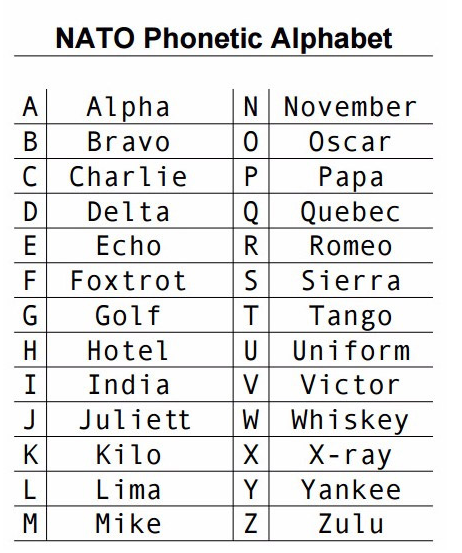How Much Do You Know About the Fascinating Nato Phonetics?
You’re like the 25-year-old me if you think the next word you should hear after Alpha is Omega. I mean, that’s what I grew up knowing. On the day of my rebirth, I sat awestruck staring at a man speaking through the phone saying A as in Alpha, S as in Sierra, F as in Foxtrot.
I initially wondered why he did not use the usual A as in Apple, S as in Snake and I admired that uniqueness, but curiosity got the best of me so I hit the Google search button and made my way to the fascinating world of NATO phonetics.
The NATO phonetics; the North Atlantic Treaty Organization also called International Radio Telephony Spelling Alphabet or ITU; International Telecommunication Union phonetic alphabet and figure code or ICAO; International Civil Aviation Organization Alphabet or Military alphabet are set of alphabets created for those who need to exchange voice messages over radio or telephone regardless of language barriers. The goal is to sound distinctive and understandable regardless of the quality of communications channels and differences in language
The NATO phonetics comprise of 26 unique alphabets and 10 unique numbers. It is believed to be the most widely used radiotelephony spelling alphabet. ICAO acrophonically assigned code words to the English letters to ensure the critical combination of letters and numbers are pronounced and understood over the radio.
The NATO alphabets are:

The Able Baker Charlie alphabet which was the Joint Army/Navy phonetic alphabets was in use from 1941 before the NATO alphabets. However, these alphabets were not universal as they were understood only by English speakers. The International Art Transport Association (IATA) after acknowledging the need for a universal alphabet presented the ICAO with a draft during the 1947 ICAO communication discussion. The draft had sounds common to English, French, Spanish, and Portuguese
Jean-Paul Vinay; a professor of linguistics at the University of Montreal worked to research and develop a new spelling alphabet following the ICAO directions which were
A word must:
- Be a live word in each of the 3 working languages; English French and Spanish
- Be easily pronounced and recognized by airmen of all languages
- Have good radio transmission and readability character
- Have similar spelling in at least English, French or Spanish and the initial letter must be the letter the word identifies with
- Be free from any association with objectionable meanings
The research was carried out from 1948–1949 and it underwent a lot of editing, revisions, and testing across common dialects. ICAO forwarded a recording of the new radiotelephony spelling alphabets to its member states in November 1955 and the final version was implemented by ICAO on 1st March 1956
The ICAO phonetic alphabet was adopted by many International and National Organizations like International Telecommunication Union (ITU), The American Radio Relay League (ARRL), The American Federal Aviation Administration (AFAA), the International Maritime Organization (IMO), the International Amateur Radio Union (IARU), the Association of Public Safety Communications Official (APCO)
The ICAO alphabets are popularly called NATO phonetics because it was adopted and put to great use by Military organizations such as the North Atlantic Treaty Organization(NATO) and the now-defunct Southeast Asia Treaty Organization (SEATO)
Alphabets are used more often in conversations than numbers. I guess that explains why the ICAO numbers didn’t earn as much popularity as the numbers. However, the ICAO numbers are used often in the Aviation sector as it is the approved phonetic number pronunciation.

There you have it; if you knew little about NATO phonetics now you know quite much
Sources: https://www.sporcle.com/blog/2017/12/what-is-the-nato-phonetic-alphabet/
